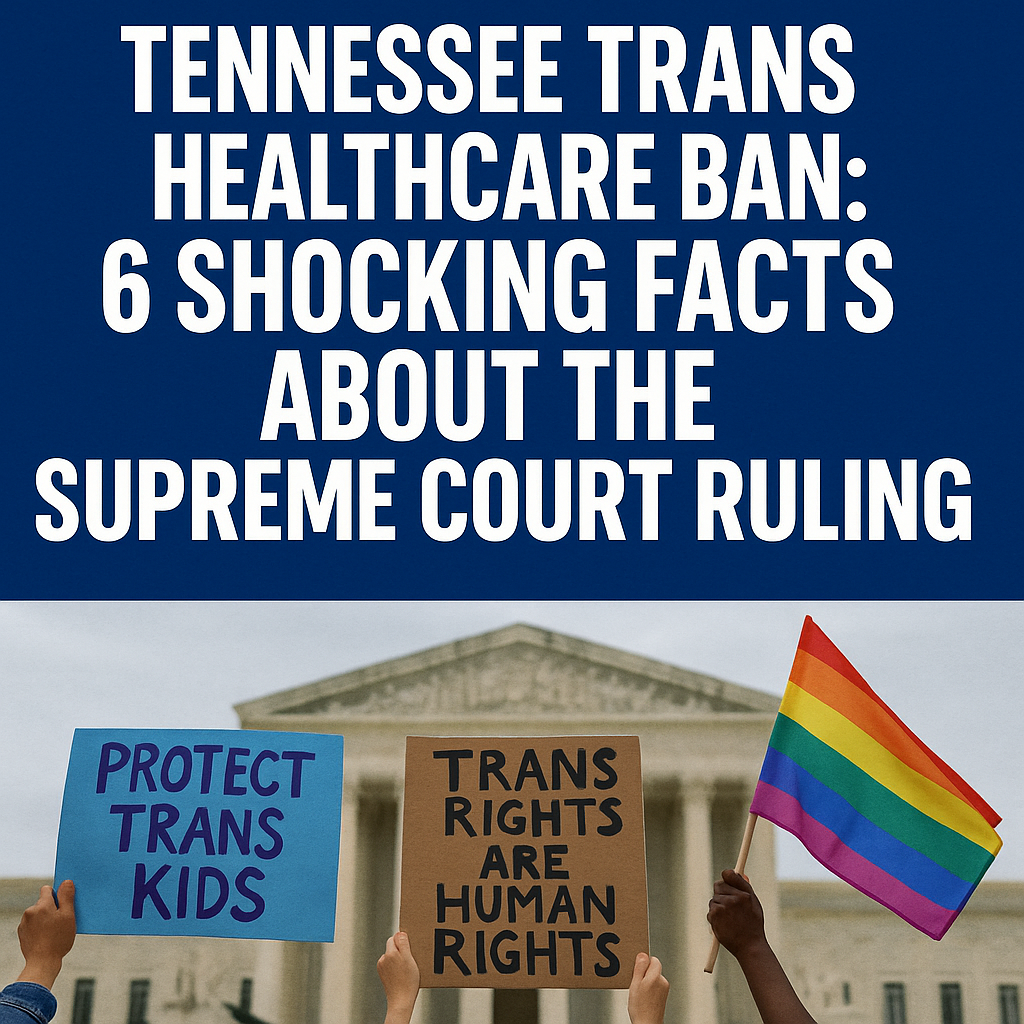The Tennessee trans healthcare ban has become one of the most controversial legislative actions affecting LGBTQ+ rights in recent U.S. history. In June 2025, the U.S. Supreme Court issued a 6–3 ruling that upheld Tennessee’s law prohibiting gender-affirming healthcare for transgender minors. This decision sent shockwaves through the LGBTQ+ community and raised deep concerns among human rights organizations and medical professionals.
This article explores the key elements of the ruling, its legal implications, the public response, and what it signals for the future of trans rights in America.
Understanding the Tennessee Trans Healthcare Ban
The Tennessee trans healthcare ban refers to a state law that prohibits healthcare providers from administering gender-affirming medical treatments—such as puberty blockers, hormone therapy, or surgeries—to individuals under the age of 18. The law was signed in 2023 and immediately faced legal challenges from civil rights groups, families of transgender minors, and medical professionals.
The case ultimately reached the U.S. Supreme Court under the name U.S. v. Skrmetti, named after Tennessee Attorney General Jonathan Skrmetti. The plaintiffs argued that the law violated the Equal Protection Clause of the 14th Amendment by discriminating against transgender youth.
Despite strong opposition and mounting legal concerns, the Supreme Court’s conservative majority upheld the law, affirming Tennessee’s right to restrict access to this form of medical care for minors. This outcome has triggered intense debate across the nation, particularly due to its implications for other states.
1. A Supreme Court Ruling That Sets a Dangerous Precedent
In a 6–3 decision, the U.S. Supreme Court ruled that the Tennessee trans healthcare ban does not violate the Constitution. Writing for the majority, Chief Justice John Roberts stated that the law “does not single out transgender individuals” and applies uniformly to all minors regardless of gender identity.
He argued that the law does not violate the Equal Protection Clause because it bans certain treatments across the board—not based on who is receiving them but rather on what purpose they serve.
However, this interpretation has been criticized as deeply flawed. Civil rights advocates argue that although the law is written in neutral terms, its impact is disproportionately targeted at transgender youth, making it discriminatory in practice.
By allowing the Tennessee trans healthcare ban to stand, the Court has paved the way for similar laws to gain legal protection, even if they clearly affect specific marginalized groups.
2. Dissenting Justices Defend Trans Youth and Medical Autonomy
In her dissent, Justice Sonia Sotomayor—joined by Justices Elena Kagan and Ketanji Brown Jackson—firmly opposed the majority ruling. She emphasized that the law infringes on the fundamental rights of both patients and physicians.
“This case is about whether Tennessee can forbid doctors from providing necessary medical care to transgender teenagers,” Sotomayor wrote. “The answer should be a resounding no.”
She further criticized the decision as a violation of medical ethics, stating that transgender individuals deserve dignity and access to appropriate care, especially during adolescence—a time of profound psychological and emotional development.
The dissent called out the Tennessee trans healthcare ban as a direct assault on the autonomy of trans youth, as well as an interference in the doctor–patient relationship. For many families, this interference could mean losing access to the care their children need.
3. Medical Experts Warn of Harmful Consequences
Numerous medical organizations—including the American Medical Association (AMA), American Academy of Pediatrics (AAP), and the Endocrine Society—have spoken out against bans like Tennessee’s, asserting that gender-affirming care is evidence-based, safe, and often medically necessary.
By denying access to puberty blockers and hormone therapy, the Tennessee trans healthcare ban may increase the risk of mental health crises among trans youth. Studies show that trans teens who receive gender-affirming care are significantly less likely to experience depression, anxiety, and suicidal ideation.
According to the Trevor Project, transgender youth with access to supportive care report better outcomes and lower suicide risk. The enforcement of the Tennessee trans healthcare ban is therefore viewed by many professionals as not only unjust, but dangerously negligent.
4. The Law Is Unequal in Application
One of the most controversial aspects of the Tennessee trans healthcare ban is its selective restriction of treatment based on gender identity. Puberty blockers and hormone therapies remain legal for treating conditions such as precocious puberty or hormonal imbalances in cisgender minors. However, when the same medications are used to treat gender dysphoria, they become illegal.
Chase Strangio, a civil rights attorney with the ACLU, described the law as “deeply hypocritical.”
“The law restricts medical care only when provided to induce physical effects inconsistent with birth sex. This creates a clear disparity in treatment based solely on gender identity.”
This contradiction undermines the claim that the law treats all minors equally, and it reveals its true intent: to target transgender youth specifically. Critics argue that the Tennessee trans healthcare ban is a form of state-sanctioned discrimination masked in neutral language.
5. A Climate of Escalating Anti-LGBTQ+ Legislation
The Tennessee trans healthcare ban is part of a much broader and troubling trend in American politics. According to the American Civil Liberties Union (ACLU), over 530 anti-LGBTQ+ bills were introduced across the United States in 2025 alone. Out of those, 112 bills directly targeted healthcare for trans individuals, particularly minors.
This wave of legislation—described by many as a coordinated backlash against LGBTQ+ visibility and rights—includes bathroom bans, curriculum censorship, sports restrictions, and now, the criminalization of essential medical care.
The Supreme Court’s ruling signals that even the highest legal authority in the nation may be willing to allow such legislation to stand. As a result, the Tennessee trans healthcare ban may embolden lawmakers in other conservative states to introduce or reinstate similar laws.
For those seeking continuous updates on LGBTQ+ legislation, visit Enola’s News Page.
6. Public Outrage and Grassroots Resistance
The Supreme Court’s decision has sparked widespread protest. In cities across the United States—including Nashville, New York, Chicago, and Los Angeles—thousands gathered in opposition to the Tennessee trans healthcare ban. Outside the U.S. Supreme Court, demonstrators held signs reading “Protect Trans Kids” and “Healthcare is a Human Right.”
Activists and advocacy organizations are doubling down on efforts to:
-
Provide legal aid to affected families,
-
Offer out-of-state healthcare access,
-
Challenge similar laws in other states,
-
Educate the public on the value of trans-inclusive policies.
Organizations such as GLAAD, Human Rights Campaign, and Lambda Legal continue to be at the forefront of this fight, offering legal resources and media platforms to amplify trans voices.
Across social media and community spaces, the resistance to the Tennessee trans healthcare ban continues to grow. Public figures, medical professionals, educators, and parents are coming together to demand change and protect the rights of transgender youth.
What Comes Next for Trans Youth in Tennessee and Beyond?
The Tennessee trans healthcare ban is not just a state issue—it’s a warning sign of what may come in other parts of the country. This decision lays the groundwork for a wave of anti-trans legislation to follow, legitimized by the highest court in the land.
Already, states like Florida, Texas, Arkansas, and Missouri have begun introducing or enforcing similar restrictions. Some bills go even further, proposing criminal penalties for healthcare providers and parents who seek to support their trans children’s health.
Families in Tennessee and beyond are now forced to make impossible decisions—whether to uproot their lives and move to safer states, attempt to obtain underground care, or wait in fear as their children suffer without the treatment they need.
The national impact of the Tennessee trans healthcare ban cannot be overstated. It is not only about healthcare—it is about the ability of transgender people to live, thrive, and be recognized as full members of society.
How You Can Support Trans Youth
This ruling is a wake-up call. Trans youth are under attack—not just politically, but in schools, healthcare systems, and often within their own communities.
Here’s how you can support them:
-
Educate Yourself: Read about gender dysphoria and the standards of care from sources like WPATH.
-
Speak Up: Contact your local representatives. Let them know you oppose discriminatory laws.
-
Donate: Support organizations like Trans Lifeline, ACLU, or The Trevor Project.
-
Create Safe Spaces: Make your school, workplace, or home inclusive by respecting pronouns, identities, and individual stories.
-
Vote: Advocate for inclusive legislation and vote out lawmakers who sponsor anti-trans bills.
Final Thoughts: A Crossroads for Trans Rights
The Tennessee trans healthcare ban is more than just a policy—it’s a cultural statement about whose bodies are protected and whose are politicized. While the Supreme Court may have spoken, the national conversation is far from over.
At Enola.gr, we remain committed to sharing the stories that matter most to the LGBTQ+ community. The fight for dignity, healthcare, and human rights continues—and your voice is part of that fight.












